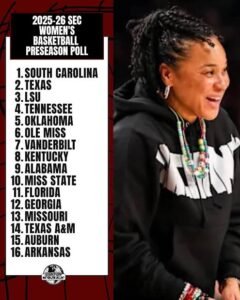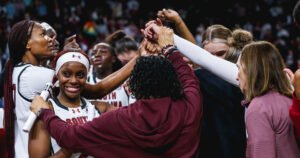Breaking News: No Player in America Commits to Auburn Tigers Football – A Stunning Development in College Recruiting..

Breaking News: No Player in America Commits to Auburn Tigers Football – A Stunning Development in College Recruiting
In an unprecedented and stunning development in the world of college football recruiting, the Auburn Tigers find themselves in uncharted territory: not a single recruit in America has committed to their football program for the upcoming cycle. For a program with a storied tradition in the Southeastern Conference (SEC) and multiple national championships in its history, the absence of any commitments sends shockwaves throughout the college football landscape and raises critical questions about the direction of Auburn’s football future.
A Stark Contrast to Tradition
The Auburn Tigers are no strangers to recruiting battles. With legendary players like Bo Jackson, Cam Newton, and Cadillac Williams having worn the orange and blue, the Tigers have long been a magnet for top-tier talent. Historically, Auburn has consistently fielded competitive recruiting classes, ranking within the top 10 or 20 nationally and maintaining a reputation as a premier destination for high school football stars.
This year, however, things have taken a dramatic turn.
With national signing days approaching and the recruiting season in full swing, programs across the country have already secured commitments from 4-star and 5-star athletes, with some schools like Georgia, Alabama, and Ohio State loading up on elite talent. In stark contrast, Auburn’s commitment board remains completely blank.
Why Is No One Choosing Auburn?
There are several possible factors contributing to this baffling development.
1. Coaching Instability
Since the departure of Gus Malzahn in 2020, Auburn has experienced significant turnover at the head coaching position. Bryan Harsin’s short-lived and tumultuous tenure left a vacuum of confidence in the program’s direction, and while current head coach Hugh Freeze was brought in with hopes of revitalizing the program, his impact on recruiting has yet to materialize in meaningful results. Uncertainty about Freeze’s long-term viability and questions about leadership consistency may be causing top recruits to look elsewhere.
2. SEC Power Shift
The SEC remains the most competitive conference in college football, and recent years have seen a consolidation of power among a few elite programs—namely Georgia, Alabama, and LSU. These programs not only win consistently but also serve as virtual pipelines to the NFL. Recruits may feel that their development and visibility would be maximized at one of these perennial powerhouses, making it difficult for Auburn to break through despite its own historical pedigree.
3. NIL and the New Recruiting Game
Name, Image, and Likeness (NIL) opportunities have drastically reshaped college recruiting. Programs with organized, well-funded collectives have a considerable advantage in luring top talent. It’s possible that Auburn has fallen behind in establishing an aggressive NIL strategy, making it less attractive for players who are now rightfully looking to maximize their marketability and earning potential even before turning pro.
4. Negative Publicity and Off-Field Concerns
Auburn has not been immune to controversy in recent years. Between coaching controversies, internal administrative upheaval, and perceived dysfunction, the program’s public image has suffered. Even if these issues are being resolved internally, the perception of disarray can be a major deterrent for recruits and their families.
Reactions from the College Football World
The absence of a single commitment to a Power Five program—especially one with Auburn’s stature—is unheard of. Recruiting analysts and fans alike have been left stunned. Steve Wiltfong, Director of Recruiting for 247Sports, commented on the situation:
> “This is absolutely unprecedented. Auburn has always been a major player in recruiting circles. To have zero commits at this stage raises serious red flags. Something deeper is going on behind the scenes.”
Fans have taken to social media to express frustration, disbelief, and concern. Many are calling for administrative changes, while others are rallying behind the coaching staff, believing the lack of commitments could be part of a broader long-term strategy to secure high-profile transfers or flip elite recruits late in the cycle.
Is the Transfer Portal a Factor?
One possible explanation for this unusual strategy may lie in the ever-expanding role of the transfer portal. Increasingly, college programs are building competitive rosters by landing experienced college players rather than relying solely on high school recruits.
Hugh Freeze has previously shown success in attracting transfers. If Auburn is focusing its efforts on players already in the portal, that may partially explain the lack of traditional recruiting commitments. However, this would still be a risky move. While transfers can provide immediate impact, they often lack the long-term development trajectory and cultural buy-in that come with four-year players.
The Road Ahead
If Auburn hopes to reverse this narrative, urgent action is needed. That includes:
Rebuilding Recruiting Relationships: The coaching staff must reach out to high school coaches, parents, and 7-on-7 organizers to repair or reinforce pipelines.
Clear NIL Communication: The administration must clearly articulate its NIL strategy and offer reassurance to prospective players that Auburn is a place where they can succeed both on and off the field.
Winning Matters: Success on the field may ultimately be the best recruiting tool. A strong upcoming season could restore faith in the program and prompt a wave of late commitments.
Transparency with Fans: Auburn’s loyal fan base deserves transparency and leadership that will rally the community rather than divide it. Fan engagement can help create a positive perception that trickles down to the recruits.
Final Thoughts
Auburn’s current recruiting situation is more than just a headline—it’s a potential turning point in the program’s trajectory. The Tigers still have time to recover, but the window is narrowing fast. In today’s rapidly evolving college football ecosystem, perception is reality, and right now, the perception around Auburn is cause for concern.
For a program that once stood toe-to-toe with the nation’s elite, this development is a wake-up call. Whether Auburn responds with urgency and clarity—or continues to spiral into recruiting irrelevance—remains to be seen. But one thing is certain: the college football world will be watching.



